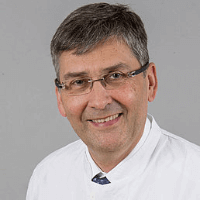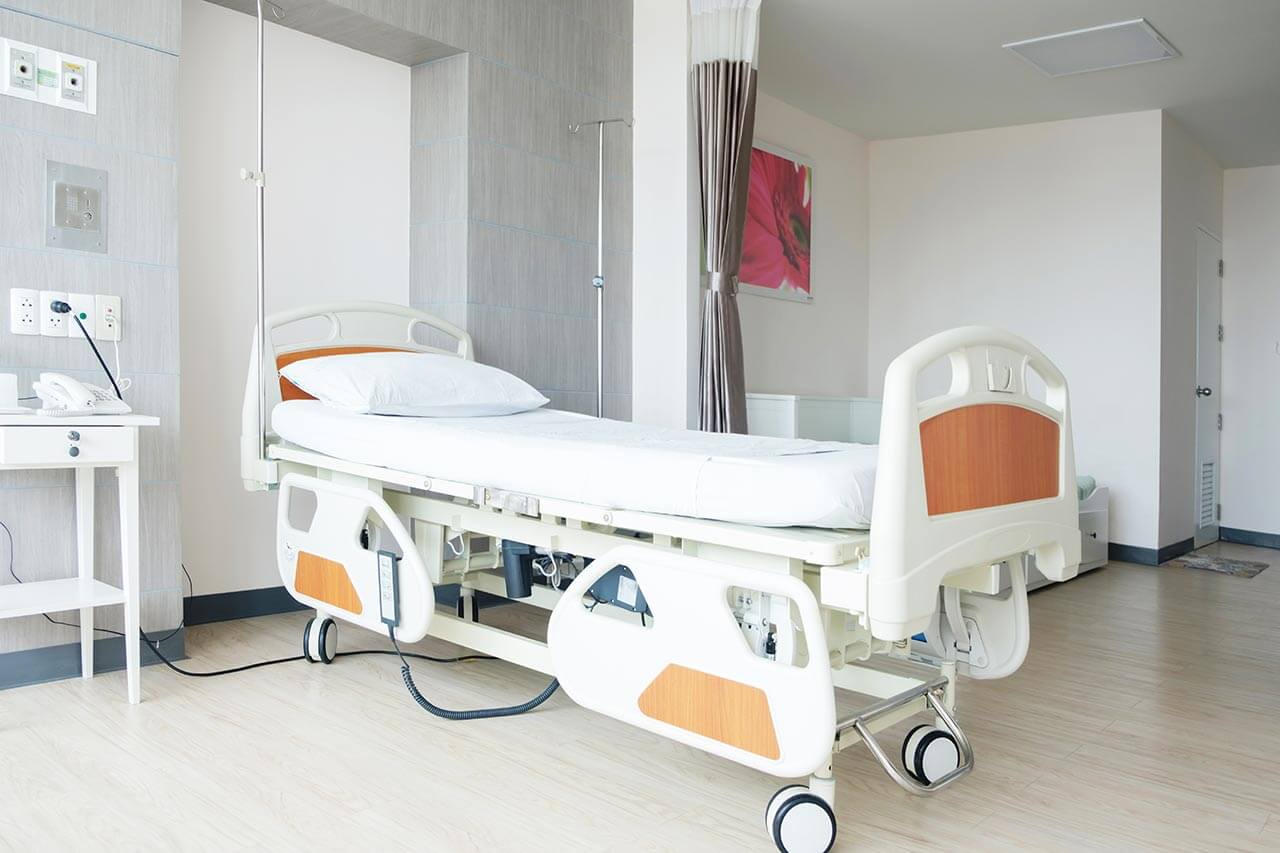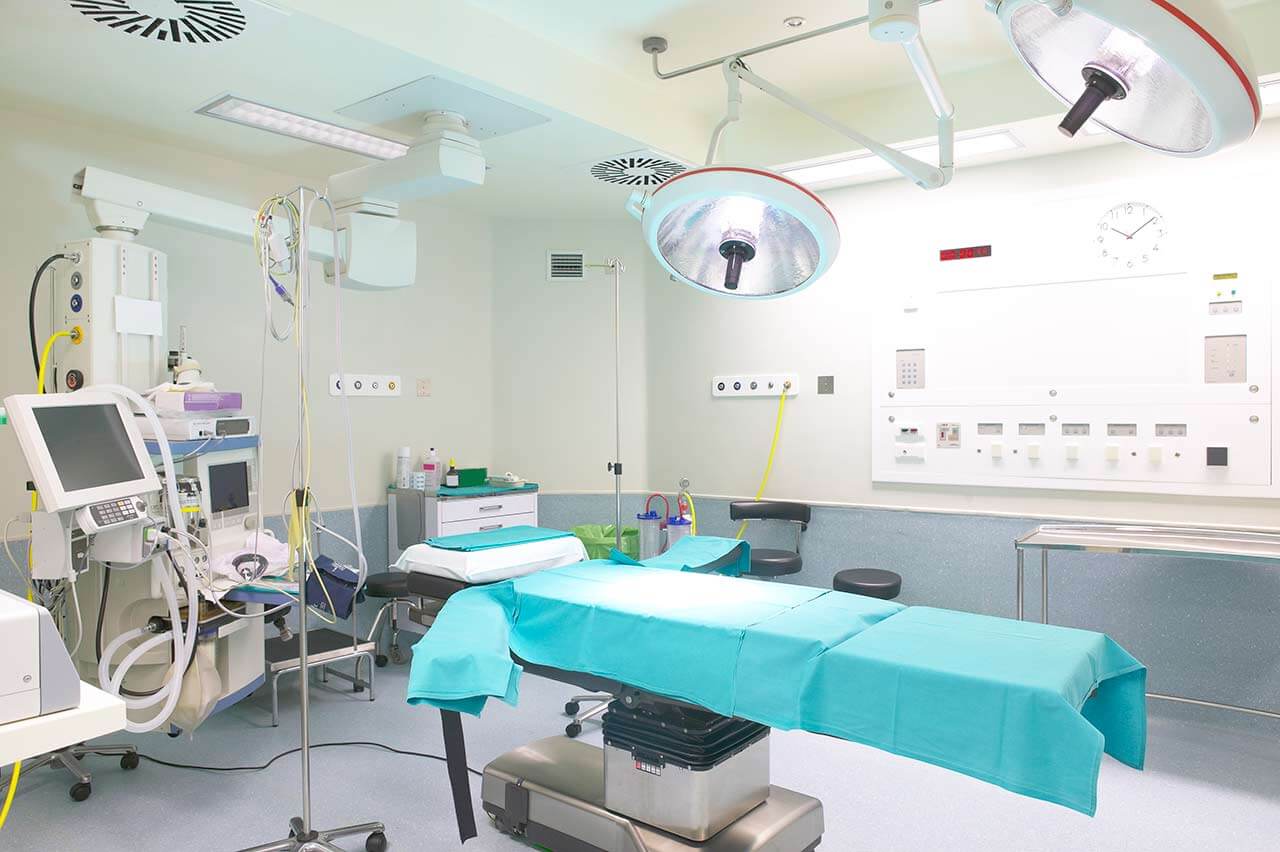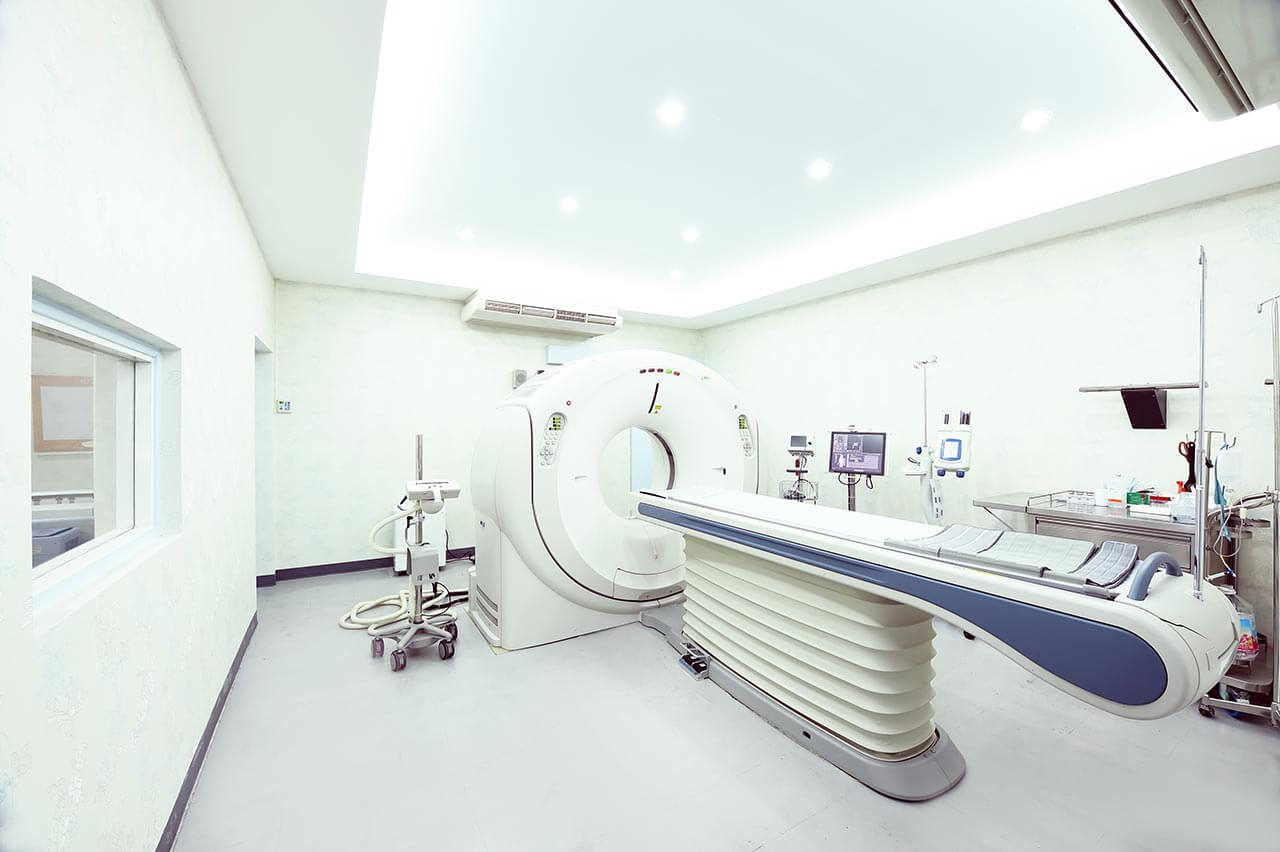
The program includes:
- Initial presentation in the clinic
- case history collection
- general clinical examination
- laboratory tests:
- complete blood count
- general urine analysis
- biochemical analysis of blood
- TSH-basal, fT3, fT4
- tumor markers
- indicators of inflammation
- indicators blood coagulation
- pelvic ultrasound
- gynecological examination
- transvaginal ultrasound
- colposcopy
- preoperative care
- scraping with subsequent analysis
- breast ultrasound
- hysteroscopy and therapeutic curettage of uterus
- symptomatic treatment
- cost of essential medicines
- nursing services
- stay in the hospital with full board
- full hospital accommodation
- elaboration further recommendations
Required documents
- Medical records
- Ultrasound scan (if available)
Service
You may also book:
 BookingHealth Price from:
BookingHealth Price from:
About the department
According to the Focus edition, the Department of Gynecology, Gynecologic Oncology, Urogynecology and Mammology at the St. Antonius Hospital Eschweiler ranks among the top German medical facilities specializing in breast cancer treatment!
The department offers all the options of modern medicine for the prevention, diagnostics and treatment of the full range of diseases of the female genitalia. It provides comprehensive diagnostics of the female reproductive system and breast, as well as effective treatment of various gynecological diseases and breast pathologies. The doctors of the department successfully perform sparing minimally invasive interventions and plastic reconstructive interventions in the pelvic floor in the progressive operating rooms. Of particular interest for the department's gynecologists is the treatment of malignant diseases of the female reproductive system and breast cancer. In addition, the department's specialists are distinguished by their outstanding achievements in the treatment of uterine fibroids, endometriosis, urinary incontinence and pelvic organ prolapse. The doctors of the medical facility pay great attention to personal communication with their patients, support them in every possible way and strive to create the most comfortable conditions during the entire therapeutic process. The Chief Physician of the department is Dr. med. Ion-Andrei Müller-Funogea.
The specialists in the field of gynecologic oncology deal with the treatment of uterine, cervical, ovarian and vulvar cancers. To make a diagnosis, the specialists usually use laboratory tests, classical and transvaginal ultrasound examination, as well as biopsy. In some cases, additional imaging tests (CT, MRI) may be required. With the diagnostic results confirming cancer, gynecologists in cooperation with oncologists and radiation therapists begin to develop an optimal treatment regimen. The treatment protocol in most cases includes a surgical resection of the malignant tumor, which may be complemented by chemotherapy, radiation therapy, immunotherapy, antibody therapy and other treatments. Each clinical case is unique, and therefore the type of surgery, the intensity and duration of the course of conservative therapy are determined on an individual basis. In the field of surgical treatment, the specialists always give preference to minimally invasive surgery, if possible. When treating cancer in young women, the doctors always strive to preserve fertility, providing the patient with the opportunity to experience the joy of motherhood in the future.
The department offers the services of a specialized Breast Center, which task is the treatment of benign and malignant breast diseases. The first stage is comprehensive diagnostics, which provides data on the stage of the tumor, its size, localization and other important aspects determining the further treatment tactics. The department's diagnostic options in the field of mammology include high-resolution ultrasound examination, mammography, magnetic resonance imaging, ultrasound- or X-ray-guided vacuum-assisted and punch biopsy, as well as histological examination. The treatment is planned with the participation of mammologists, gynecologists, oncologists, radiologists, radiation therapists and plastic surgeons. It is the interdisciplinary approach that allows achieving a complete cure for oncology or a long-term remission. It should be noted that more than 70% of breast cancer surgeries are performed in the department using breast-conserving techniques, and this means that in most cases women manage to avoid radical surgery with total breast removal. If the patient has to undergo total mastectomy, she can also undergo a reconstructive surgical procedure in order to restore the shape of her breast using implants or autologous tissues (the reconstructive technique is selected individually for each patient). To completely kill cancer cells, the only surgery is not enough. Therefore, the intervention is followed by such additional conservative treatment methods as chemotherapy, radiation therapy, antibody therapy, anti-hormonal therapy, etc. In addition, the department employs qualified psychologists who are always ready to provide psychological support to both women and their relatives.
The department often admits the patients with benign gynecological diseases as well. Uterine fibroids and endometriosis are among the most common benign pathologies. The early stages of these diseases usually do not manifest any symptoms, but with their progression a woman experiences menstrual irregularities, back pain, bloating, constipation and frequent urination. Without timely treatment, uterine fibroids and endometriosis can cause infertility. In many cases, benign gynecological diseases can be effectively treated with drugs. The surgical interventions are performed only in advanced clinical cases. The department's gynecologists perform surgery for uterine fibroids and endometriosis using minimally invasive techniques. These surgical procedures involve only a few skin incisions, through which a mini camera and special instruments are inserted. Thus, the postoperative recovery period is significantly reduced and the patient can return to her daily life in the shortest possible time. Upon the completion of treatment, the department's specialists recommend the patients to undergo regular diagnostic examinations, since uterine fibroids and endometriosis are recurrent diseases.
The department's services range is complemented by the treatment of urinary incontinence and pelvic organ prolapse. In addition, the specialists in this area provide medical care to the patients suffering from functional diseases of the entire pelvic floor, including the bladder and colon. The first-line treatment is always conservative therapy (medication and physical therapy to strengthen the pelvic floor muscles). The surgical procedure can be performed only if the conservative treatment is ineffective.
The department's key clinical focuses include:
- Gynecology
- Diagnostics and treatment of uterine fibroids
- Diagnostics and treatment of endometriosis
- Drug therapy
- Minimally invasive surgery
- Gynecologic oncology
- Diagnostics and treatment of uterine cancer
- Diagnostics and treatment of cervical cancer
- Diagnostics and treatment of ovarian cancer
- Diagnostics and treatment of vulvar cancer
- Classic open surgery
- Minimally invasive surgery
- Chemotherapy
- Radiation therapy
- Immunotherapy
- Antibody therapy
- Urogynecology
- Diagnostics and treatment of urinary incontinence
- Diagnostics and treatment of pelvic organ prolapse
- Drug therapy
- Physiotherapy to strengthen the pelvic floor muscles
- Minimally invasive surgery
- Mammalogy
- Diagnostics and treatment of breast cancer
- Organ-conserving surgery
- Total mastectomy (total breast resection)
- Reconstructive plastic surgery to restore the shape of the breast using implants and autologous tissues
- Chemotherapy
- Radiation therapy
- Antibody therapy
- Anti-hormonal therapy
- Diagnostics and treatment of breast cancer
- Other medical services
Curriculum vitae
Higher Education
- 2010 - 2014 Study of Urogynecology (PhD), Carol Davila University of Medicine and Pharmacy in Bucharest.
- 1979 - 1985 Study of Human Medicine, Carol Davila University of Medicine and Pharmacy in Bucharest.
Professional Career
- Since July 2018 Chief Physician of the Department of Gynecology, Gynecologic Oncology, Urogynecology and Mammology at the St. Antonius Hospital Eschweiler.
- Since April 2015 Board Member of the Special Group on Urogynecology (focus on minimally invasive surgery).
- July 2014 - June 2018 Chief Physician of the Department of Obstetrics, Gynecology and Urogynecology, Marien Hospital.
- November 2002 - June 2014 Chief Physician, Department of Gynecology, Medizinisches Zentrum StädteRegion Aachen.
- August 2001 - October 2021 Senior Physician, Department of Gynecology, Bethesda Hospital Duisburg.
- January 1998 - August 2013 Senior Physician, Department of Gynecology and Obstetrics, Luisenhospital Aachen.
Qualifications
- Board certification in Gynecology and Obstetrics.
- Additional qualification in Urogynecology.
- Special certification in Minimally Invasive Surgery MIC II.
- Certificate of the Medical Association of North Rhine-Westphalia in Obstetrics and Perinatal Medicine.
- Certificate of the Working Group on Gynecologic Oncology.
- Certificate in Ultrasound Diagnostics of the Breast and Female Reproductive System.
- Certificate in Acupuncture.
Memberships in Professional Societies
- German Society of Gynecology and Obstetrics (DGGG).
- German Continence Society.
- German Society of Ultrasound in Medicine (DEGUM).
- American Urogynecologic Society (AUGS).
- American Association of Gynecologic Laparoscopists (AAGL).
- East European Society for Endometriosis and Infertility (EESEI).
Photo of the doctor: (c) St.-Antonius-Hospital
About hospital
According to the prestigious Focus magazine, the St. Antonius Hospital Eschweiler ranks among the top medical facilities in North Rhine-Westphalia!
The hospital is a modern medical complex with 13 specialized departments. The hospital has more than 165 years of history, so it has long won an excellent reputation not only in Germany, but also in the European medical arena. In addition, the medical facility has the status of the Academic Hospital of the RWTH Aachen University, thanks to which it can offer patients the very latest and unique medical advances. The highly qualified medical staff of the hospital, consisting of more than 1,300 employees, is focused on high-quality medical services with due consideration of the personal needs and wishes of patients
The medical complex has 443 beds. More than 15,000 inpatients undergo diagnostics and treatment on an inpatient basis, while about 25,000 patients receive ambulatory medical care. The specialists of the hospital often provide diagnostic services and treatment to the patients from foreign countries.
The main areas of clinical practice of the medical facility include oncology, hematology, general and abdominal surgery, plastic surgery, hand surgery, vascular surgery, internal medicine, gynecology, urology and radiation oncology. Each area is represented by an experienced team of doctors and specially trained nursing staff, whose task is to provide the accurate diagnostics and the most effective treatment. The work of the medical staff is based on the use of modern technical resources, as well as classic and innovative treatment methods. The doctors from different medical specialties cooperate closely with each other, so the slightest details and characteristics of the patient's body are taken into account when planning and providing treatment. In addition, the medical staff is always open to personal communication with the patients, strives for their moral support on their way to recovery and surrounds them with care.
The outstanding achievements of the hospital and high treatment success rates are confirmed by the quality certificates of the German Cancer Society, the German Cardiac Society, the German Society of Vascular Surgery, the German Society of Hematology and Medical Oncology and the German Trauma Society. In addition, according to the famous Focus magazine, the hospital is recognized as one of the best medical centers in Germany specializing in the treatment of breast cancer, prostate cancer and cardiovascular diseases.
Photo: (с) depositphotos
Accommodation in hospital
Patients rooms
The patients of the St. Antonius Hospital Eschweiler live in cozy and light rooms. All the patient rooms are well equipped to make the patient feel as comfortable as possible throughout the entire period of hospital stay. The patient room includes an automatically adjustable bed, a bedside table, a wardrobe, a TV and a telephone. Each patient room has an ensuite bathroom with shower and toilet. Some patient rooms have specially designed bathrooms for disabled people. The patient rooms also have Wi-Fi.
If desired, the patient with his accompanying person can live in the enhanced comfort room. These patient rooms are additionally equipped with upholstered furniture, a mini fridge and a safe for storing valuables.
Meals and Menus
The patient and his accompanying person are offered tasty and healthy three meals a day: breakfast, lunch and dinner. Breakfast and dinner are served buffet style, while for lunch there is a choice of three set menus. If for some reason you do not eat all the foods, you will be offered an individual menu.
The hospital also has a cozy cafe with a large choice of salads, main courses, pizza, cakes and ice cream. Here you can enjoy aromatic coffee, delicious tea or soft drinks.
Further details
Standard rooms include:
Religion
The religious services are available upon request.
Accompanying person
During the inpatient program, the accompanying person can live with the patient in a patient room or a hotel of his choice. Our managers will help you choose the most suitable option.
Hotel
During the outpatient program, the patient can stay at the hotel of his choice. Our managers will help you choose the most suitable option.




